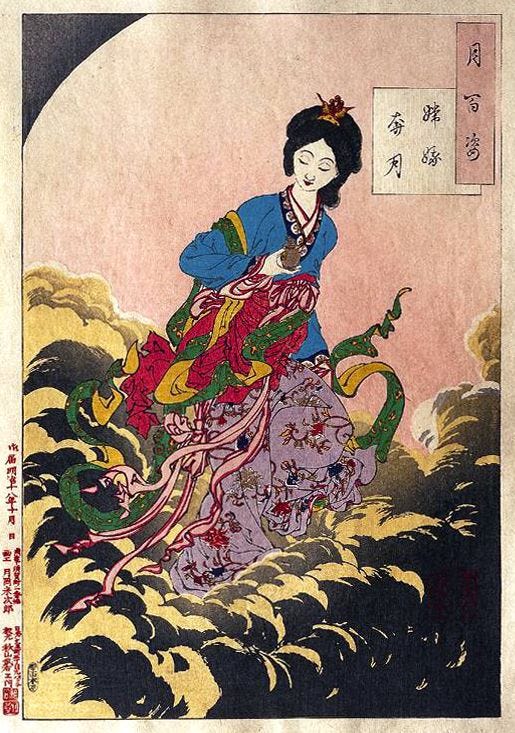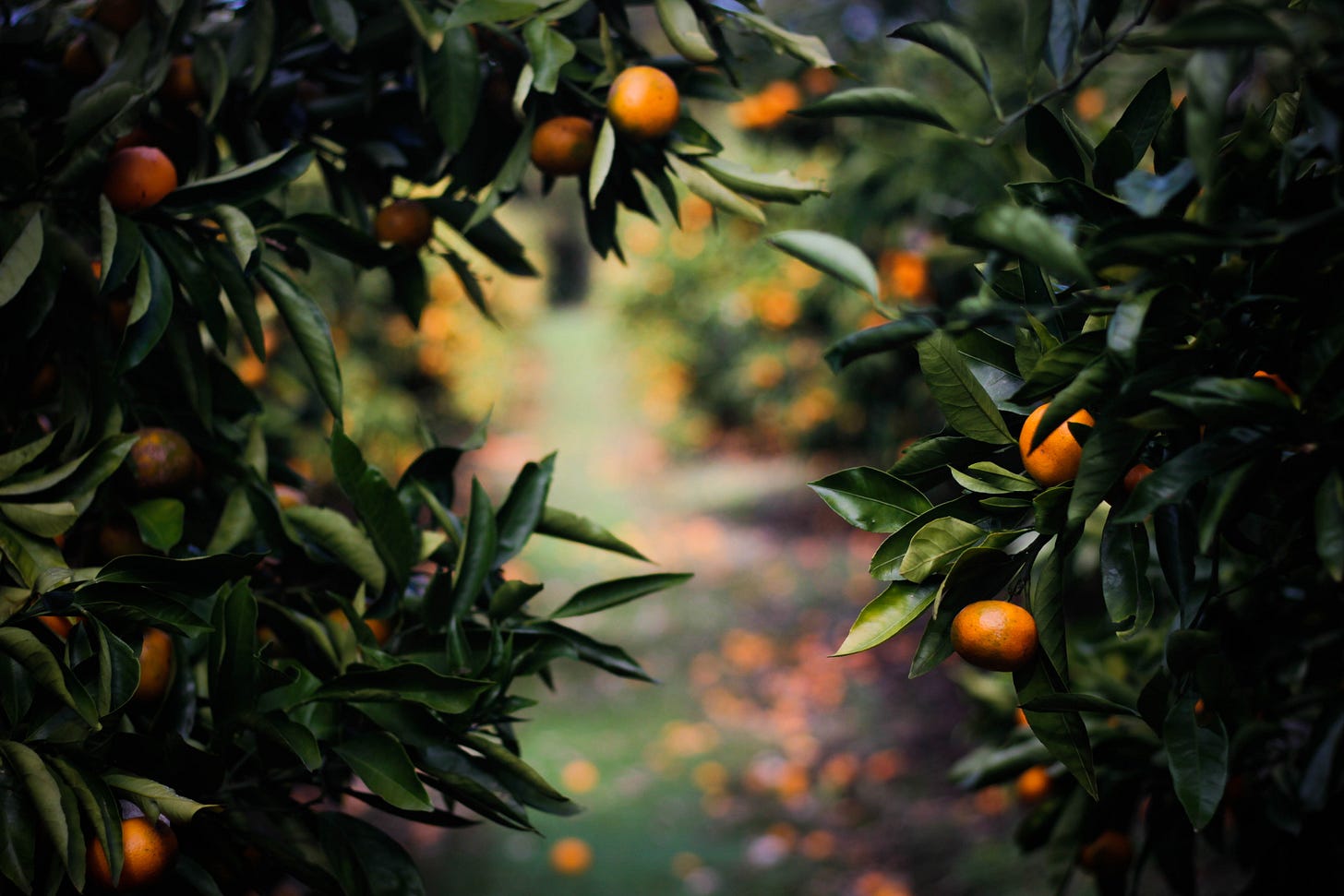The chinchilla sits on the foot of a barren hill, surrounded by Moon dust, looking down at Earth. It gazes at the water and imagines bending it to its will, calling it up on the Moon, transforming an empty valley into a refreshing lake.
Back on Earth, in Osaka, Japan, the Scientist is looking up at the Moon, thinking of his Lover half a world away. He remembers Natsume Soseki, his notion that "The moon is beautiful" is actually a more poetic way of saying "I love you"1. His Lover isn't Japanese like Soseki or the Scientist himself but he knows she'd understand instantly. She's a voracious reader, fiercely clever.
He, on the other hand, isn't a poet and only an occasional reader. All he can do is ask the Moon to bring her back to him soon.
The chinchilla ponders this request. It wonders if its longing for water might be comparable with the Scientist's longing for his Lover. Eventually, it jumps down to Earth and finds the Lover who is just picking a persimmon from a tree in her backyard. She bites into the persimmon and sucks the juice out of it.
The chinchilla is enraptured by this lust for life and decides to stay on Earth a little longer.
It watches the Lover tend to the persimmon tree, two fig trees, a bunch of herbs, and even some capricious white orchids. It quivers when she digs her bare fingers into the soil. It flicks its ears when she makes the rounds with a yellow watering can.
It also watches the Scientist leave his studio apartment every morning at precisely eight thirty to do work that is highly complex and specific, and return every evening at precisely seven o'clock. On the weekends, it watches him sleep in, then walk to the neighbourhood coffeehouse to read the science and technology news on his phone.
His life is ordered, crystal-clear with purpose; his Lover's life crackles with chaotic growth, her pockets always filled with interestingly shaped leaves and stones. Still, they have commonalities, the first of which is their longing for each other.
On a warm autumn eve, the chinchilla waits for the Lover under the persimmon tree. The round Moon watches from high up in the sky as the Lover joins the chinchilla on the grass and listens.
Later, she takes its paw and is spirited away.
The Scientist refuses to listen at first, too tangled in his rational mind. Eventually, the chinchilla jumps him and he catches it on reflex. He, too, is spirited away.
On the Moon, there is a lake no more than five humans in diameter. Every day, the chinchilla stole some water out of the yellow watering can, leaving just enough for the health of the Lover's trees, herbs, and orchids.
The Scientist and the Lover meet on the lake shore. For some time, they only see and touch each other. To each of them, the other has new edges and new delights, wrought by change, the only constant over the time spent apart. Eventually, they marvel at the Moon dust caking their feet, at the Earth glowing before them in the sky. They see its blue reflected in the lake on the Moon.
"Dear Scientist, dear Lover," the chinchilla says then, "this lake is without a wellspring to help it thrive. Your love would provide more than enough nourishment for this barren place, my home. Will you stay here and tend to it for me?"
The Scientist looks to the Lover who gives her warm agreement. Together, they tend to the lake on the Moon until a garden springs up all around and the valley is no longer barren but vibrant with life.
It is not the life they know from Earth. At first they struggle with its pale Moon variations but the Scientist studies their secrets and the Lover fulfils their desires until they are welcomed by the Moon. Soon after, they harvest the first persimmons. The chinchilla visits frequently and they take walks full of conversation and laughter.
The Moon is never barren or lonely again.
It remains beautiful.
Author Notes
This is a story about wish-fulfilling and people starting over in a new place, using their particular expertise and skills to create a better world filled with love instead of selfishness and greed, told in the style of a folktale.
I definitely thought of the Chinese folktale of the moon goddess Chang'e as well as the moon rabbit pounding away at mooncakes, mochi, or the elixir of immortality (depending on the legend). Coincidentally, Chang'e and the moon rabbit inspired the Chinese Mid-Autumn Festival in mid-September to early October—right around this time of year! Its Japanese variant is called 月見 tsukimi or moon-viewing.

In the first version of the story, I had the the Scientist and the Lover 'whisked away' but changed it to 'spirited away' during the edits. Believe it or not, spiriting away or 神隠し kamikakushi is a real thing in Japan! Kakushi means 'hiding away', kami is the word for Shinto deities. It's what happens to Chihiro in the Ghibli film Spirited Away but I really thought about it for the first time when reading 『神去なあなあ日常』 or The Easy Life in Kamusari by Miura Shion earlier this year. In this novel, set in a remote mountain village, the child Santa disappears for several hours in the forest only to turn up again, unharmed and cheerful, when the search is already in full swing. He doesn't remember what happened to him but the village elders know that the occasional spiriting away of children by the local mountain deity is just part of life in Kamusari.
And in a densely populated country such as Japan, who can really fault people for wanting to disappear for a few hours?
And the chinchilla? To be quite honest, it was the song Elements by CHINCHILLA, stuck in my head on repeat. Nothing mysterious about that, I'm afraid!
For an extensive discussion of this quote, see The Mystery of Soseki and Tsuki ga Kirei.




Lovely. Very interesting writing
Lovely. I really enjoyed all your author notes here, Vanessa. I love reading about folklore and myth, and this was some excellent info.